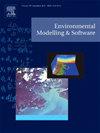基于多层感知器的变流量岩溶管道溶质输运参数与过程预测
IF 4.8
2区 环境科学与生态学
Q1 COMPUTER SCIENCE, INTERDISCIPLINARY APPLICATIONS
引用次数: 0
摘要
该研究首次应用了贝叶斯优化多层感知器(MLP)框架来预测不同流动条件下两条管道的完全突破曲线(BTC),而之前的研究仅预测部分突破曲线。与随机森林和支持向量回归相比,MLP在BTC预测精度上有显著提高。然后,暂态存储模型对预测的btc进行模拟,得到色散系数(D)、主通道横截面积(A)、存储区横截面积(As)和交换系数(α)。开发并训练了54个MLP模型,并在情景S1-S3中逐步增加了训练数据和输入变量。S2和S3较S1显著提高BTC预测精度,R2≥0.9。S2和S3预测A的误差为<; 6.6%,预测A和α的误差分别为<; 20%和<; 50%。这些结果证明了MLP预测变流量岩溶管道溶质输运参数的有效性。本文章由计算机程序翻译,如有差异,请以英文原文为准。
Updated multi-layer perceptron algorithm for predicting solute transport parameters and processes in karst conduits with variable flow rates
This study pioneers the application of a Bayesian-optimized multilayer perceptron (MLP) framework to predict the complete breakthrough curve (BTC) in two conduits under various flow conditions, unlike prior research that predicted only partial BTC. MLP shows significant advances in BTC prediction accuracy compared with Random Forest and Support Vector Regression. The transient storage model then simulates predicted BTCs to derive parameters: dispersion coefficient (D), cross-sectional area of main channel (A), cross-sectional area of storage zone (As), and exchange coefficient (α). Fifty-four MLP models are developed and trained, with an incremental increase in training data and input variables across scenarios S1-S3. S2 and S3 notably improve BTC prediction accuracy over S1, with R2 ≥ 0.9. S2 and S3 predict A with <6.6 % error, and As and α with <20 % and <50 % errors respectively. These results prove MLP's effectiveness in predicting solute transport parameters in karst conduits with variable discharges.
求助全文
通过发布文献求助,成功后即可免费获取论文全文。
去求助
来源期刊

Environmental Modelling & Software
工程技术-工程:环境
CiteScore
9.30
自引率
8.20%
发文量
241
审稿时长
60 days
期刊介绍:
Environmental Modelling & Software publishes contributions, in the form of research articles, reviews and short communications, on recent advances in environmental modelling and/or software. The aim is to improve our capacity to represent, understand, predict or manage the behaviour of environmental systems at all practical scales, and to communicate those improvements to a wide scientific and professional audience.
 求助内容:
求助内容: 应助结果提醒方式:
应助结果提醒方式:


